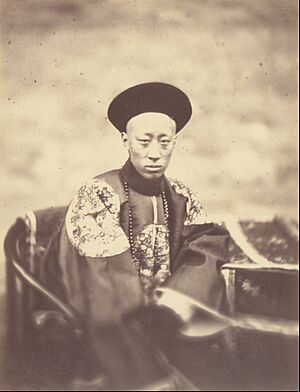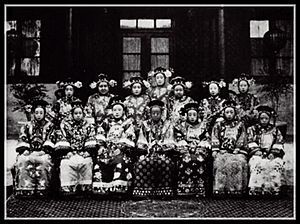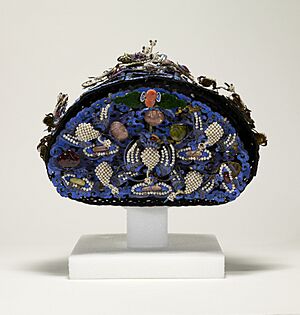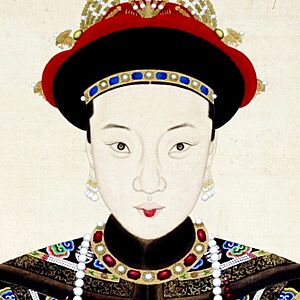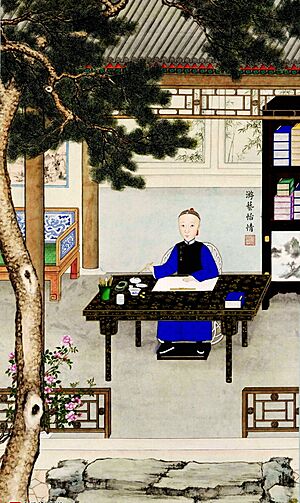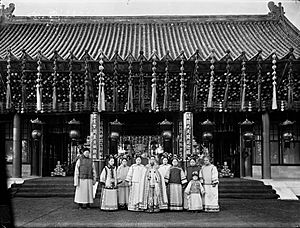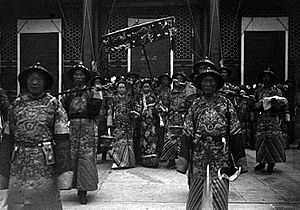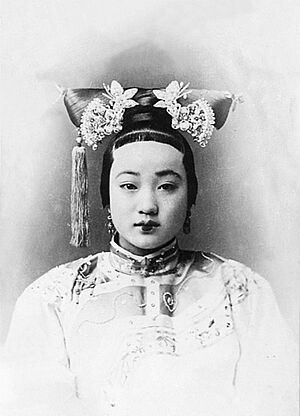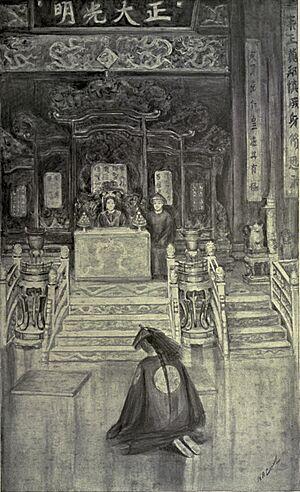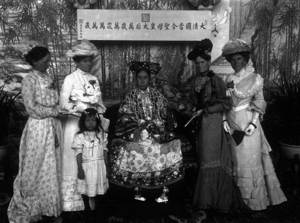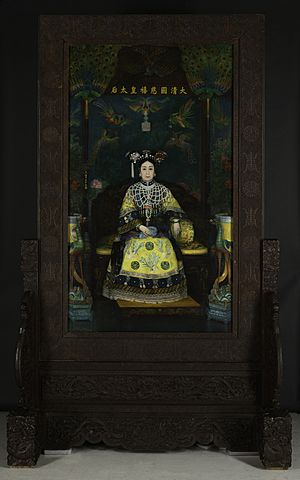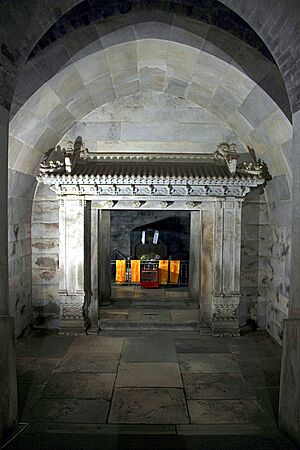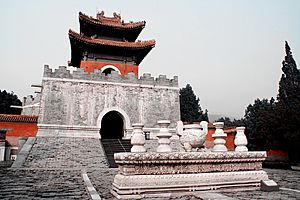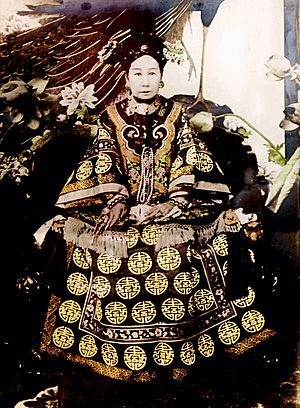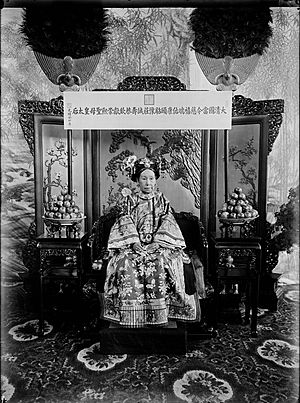Empress Dowager Cixi facts for kids
Quick facts for kids Empress Xiaoqinxian |
|||||||||
|---|---|---|---|---|---|---|---|---|---|
| (Grand) Empress Dowager Cixi | |||||||||
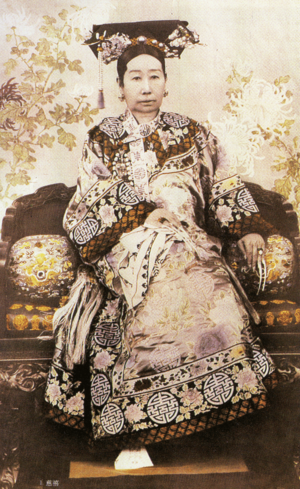
Photographed around 1890
|
|||||||||
| Empress dowager of the Qing dynasty | |||||||||
| Tenure | 22 August 1861 – 14 November 1908 | ||||||||
| Predecessor | Empress Dowager Kangci | ||||||||
| Successor | Empress Dowager Longyu | ||||||||
| Grand empress dowager of the Qing dynasty | |||||||||
| Tenure | 14 November 1908 – 15 November 1908 | ||||||||
| Born | Yehe Nara Xingzhen (葉赫那拉·杏貞) 29 November 1835 (道光十五年 十月 十日) Beijing, Qing Empire |
||||||||
| Died | 15 November 1908 (aged 72) (光緒三十四年 十月 二十二日) Yiluan Hall, Zhongnanhai, Qing Empire |
||||||||
| Burial | Ding Mausoleum, Eastern Qing tombs | ||||||||
| Spouse |
Xianfeng Emperor
(m. 1852; died 1861) |
||||||||
| Issue | Tongzhi Emperor | ||||||||
|
|||||||||
| House | Yehe Nara (葉赫那拉; by birth) Aisin Gioro (愛新覺羅; by marriage) |
||||||||
| Father | Huizheng (惠征) | ||||||||
| Mother | Lady Fuca | ||||||||
| Religion | Manchu shamanism, Tibetan Buddhism | ||||||||
| Empress Dowager Cixi | |||||||||||
|---|---|---|---|---|---|---|---|---|---|---|---|
"Empress Dowager Cixi" in Chinese characters
|
|||||||||||
| Chinese | 慈禧太后 | ||||||||||
|
|||||||||||
Empress Dowager Cixi (Chinese: 慈禧太后; pinyin: Cíxǐ Tàihòu; 29 November 1835 – 15 November 1908) was a powerful Chinese noblewoman. She was a concubine and later a regent who ruled China for 47 years. This was during the late Qing dynasty, from 1861 until her death in 1908.
Cixi was chosen as a concubine for the Xianfeng Emperor when she was young. In 1856, she gave birth to his only son, Zaichun. After the emperor died in 1861, her young son became the Tongzhi Emperor. Cixi then became a co-empress dowager, sharing power with the emperor's main wife, Empress Dowager Ci'an.
Cixi took control by removing the officials the late emperor had chosen to rule. She shared power with Ci'an, and after Ci'an's death, Cixi became the sole ruler. She made her nephew, the Guangxu Emperor, the next emperor when her son died in 1875. This was against the usual rules for who should become emperor in the Qing dynasty.
Cixi led a time of moderate changes called the Tongzhi Restoration. These changes helped the Qing dynasty survive longer. She did not want China to adopt Western styles of government. However, she supported new technologies and military improvements. She also backed the Self-Strengthening Movement. Cixi was careful about sudden changes. She feared that quick reforms could cause problems and allow foreign powers to take advantage.
After the Boxer Rebellion led to an invasion by foreign armies, Cixi first supported the Boxer groups. She even declared war on the invaders. The defeat was a huge embarrassment for China. When Cixi returned to Beijing, she started to be more friendly with foreigners. She also began new reforms to try and make China a constitutional monarchy.
Cixi and the Guangxu Emperor both died in November 1908. This left the court in the hands of conservative Manchu officials. A child, Puyi, became the new emperor. China was left with a society that was restless and deeply divided.
Historians still debate Cixi's impact. Some saw her as a harsh ruler whose old-fashioned ideas harmed China. Others say she was unfairly blamed for problems that were already very deep. They praise her for keeping political order. She also made important reforms later in her life. These included ending slavery, old punishments, and the ancient examination system. New schools, like Peking University, took their place.
Contents
Life Story
Early Years
Empress Dowager Cixi was born on 29 November 1835. Her father, Huizheng, was a duke and worked in Beijing. This means she was likely born in Beijing. She had a sister named Wanzhen and a brother named Guixiang.
Becoming a Concubine
In 1851, Cixi was one of 60 young women chosen to be possible wives for the Xianfeng Emperor. She was one of the few who were picked to stay. On 26 June 1852, she moved into the Forbidden City. She was given the title "Noble Lady Lan."
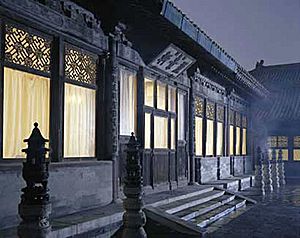
Cixi became pregnant in 1855. On 27 April 1856, she gave birth to Zaichun. He was the Xianfeng Emperor's first and only son who survived. On the same day, she was promoted to "Consort Yi." Later, she became "Noble Consort Yi," which was the second-highest rank among the emperor's wives.
Cixi was special because she could read and write Chinese. Many other Manchu women in the palace could not. This skill allowed her to help the emperor, who was often sick. She would read official reports to him and write down his instructions. This helped Cixi learn a lot about how to govern China.
Ruling with the Emperor's Son
In September 1860, British and French troops attacked Beijing. They burned the Old Summer Palace. The Xianfeng Emperor and Cixi had to flee to Rehe Province. The emperor became very ill after hearing about the palace's destruction.
Before he died, the Xianfeng Emperor chose eight ministers to help his young son rule. The emperor died on 22 August 1861. His son, Zaichun, was only five years old. The emperor's main wife became Empress Dowager Ci'an. Cixi also became "Empress Dowager Cixi." Ci'an was known as the "East Empress Dowager," and Cixi as the "West Empress Dowager."
Taking Power: The Xinyou Coup
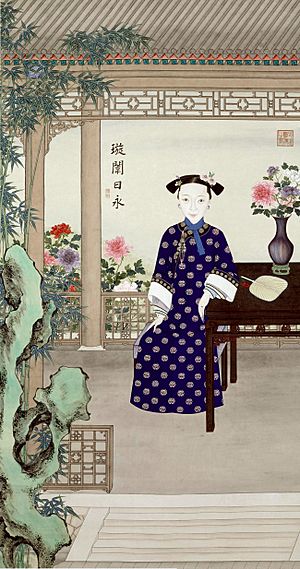
Cixi was a clever political strategist. While waiting to return to Beijing, Cixi secretly worked with other officials and royal family members. She wanted to take power from the eight regents. Cixi did not have much political power on her own. So, she allied with Empress Dowager Ci'an. Cixi suggested they rule together, with more power than the regents. They had been friends for a long time.
The regents, led by Sushun, did not like Cixi's involvement in politics. Cixi secretly gathered support from important ministers and princes. These included Prince Gong and Prince Chun. A request came from a province asking Cixi to "rule from behind the curtains." This meant she should become the real ruler.
When the emperor's funeral procession left for Beijing, Cixi and her son returned to the capital early. This gave her more time to plan with Prince Gong. They worked to weaken the regents' power. The regents were accused of being bad at dealing with foreigners.
Cixi decided to execute only three of the eight regents. She refused to punish their families, which was a break from tradition. Also, Qing tradition said women and princes should not be involved in politics. By taking power, Cixi became the only empress dowager in the Qing dynasty to rule as a regent. This event is known as the Xinyou Coup.
Ruling from Behind the Curtains
In November 1861, Cixi rewarded Prince Gong for his help. He was made Prince-Regent. However, Cixi made sure he did not have absolute power. Cixi and Ci'an issued new rules. They said they would be the only ones to make decisions. They also changed the emperor's official name to Tongzhi, meaning "collective stability."
Even though they were the main decision-makers, Cixi and Ci'an still worked with the Grand Council. They would read official documents, discuss them with Prince Gong, and then approve orders. Their most important role was to put their official seals on the orders.
Improving the Government
Cixi took power when China was facing many problems. The Taiping Rebellion was still ongoing in the south. The government was also full of corruption. Cixi decided to fix the government. She met with many officials herself. She even had two important officials executed as a warning to others.
Many reforms were put in place. A new foreign ministry, the Zongli Yamen, was created. Regional armies were strengthened. Modern factories and arsenals were built. China began to modernize and develop.
Cixi also broke tradition by giving powerful military roles to Han Chinese officials. For example, she put Zeng Guofan in charge of the army fighting the Taiping rebels. She also appointed Han Chinese officials as governors in southern provinces. This was a big change from the usual Manchu dominance.
Historians like Mary C. Wright and John K. Fairbank believe these efforts helped the Qing dynasty survive for another sixty years.
Prince Gong's Downfall
The Taiping rebels were defeated in 1864. After this, Cixi worried about Prince Gong's growing power. He controlled many armies and led important government offices. Cixi saw him as a threat.
In April 1865, a minor official accused Prince Gong of corruption. Cixi used this as a reason to remove him. She dismissed him from all his jobs. Many officials and princes asked for his return. Cixi allowed him to return to lead the Zongli Yamen, but he lost his title of Prince-Regent. Prince Gong never regained his former power. This showed that Cixi would not share absolute power with anyone.
Learning from Foreigners
Cixi realized China needed to learn from Western countries. She decided China should import Western knowledge and technology. She supported industrial programs in southern China. In 1862, she opened the Tongwen Guan, a school for foreign languages and new subjects like astronomy. Young Chinese boys were also sent to study in the United States.
However, China's efforts to learn from foreigners faced problems. Cixi bought seven British warships, but they came with British sailors and commanders. The Chinese were angry and sent the ships back. Some historians say Cixi was too traditional. For example, she stopped a railway from being built because it was too loud. She also refused to ride in a car because the driver could not bow to her. Cixi also worried that Chinese people who studied abroad would bring back ideas that threatened her power. In 1881, she stopped sending children abroad to study.
The Tongzhi Emperor's Marriage
In 1872, the Tongzhi Emperor was 17. He married the Jiashun Empress. The empress's grandfather had been one of the regents Cixi removed. This caused tension between Cixi and the empress. Cixi was also superstitious and disliked the empress's zodiac sign.
The Jiashun Empress was well-liked by the emperor and Empress Dowager Ci'an. However, she did not get along with Cixi. The emperor spent most of his time with his empress, ignoring Cixi's preferred concubine. Cixi ordered the couple to separate. The emperor became sad and angry. He started to treat his servants badly. He also began sneaking out of the palace to find entertainment.
The Tongzhi Emperor's Rule
The Tongzhi Emperor had strict teachers chosen by Cixi. But he did not like learning. According to one teacher's diary, the emperor could not read full sentences by age 16. Cixi worried about this and pushed him harder.
When he started to rule in 1873, the Tongzhi Emperor was not a good leader. He made two main decisions. First, he ordered the Summer Palace to be rebuilt. It had been destroyed by foreign armies. He said it was a gift for Cixi and Ci'an. But historians think he wanted Cixi to move out of the Forbidden City so he could rule alone.
The country's money was low from wars. The emperor asked for funds and encouraged nobles to donate. He often left court to check on the palace's progress.
His uncles, Prince Gong and Prince Chun, and other officials, asked him to stop rebuilding the Summer Palace. The emperor got angry and tried to remove them from their jobs. Cixi and Ci'an stepped in. They publicly criticized the emperor and made him change his order. Cixi told him, "without Prince Gong, the situation today would not exist for you and me."
Feeling defeated, the Tongzhi Emperor went back to his old habits. He became very ill. Doctors said he had smallpox. On 13 January 1875, the emperor died. The Jiashun Empress died soon after. By 1875, Cixi was back in full control.
Guangxu Era
New Challenges
The Tongzhi Emperor died without a son. This caused a problem for who should be the next emperor. After much discussion, Zaitian, the four-year-old son of Prince Chun and Cixi's sister, was chosen. He became the new emperor, known as the Guangxu Emperor. Guangxu means "glorious succession." Zaitian was taken from his home and raised in the palace. He had to call Cixi "Dear Father" to show her authority.
Soon after, Cixi became very ill. This meant Ci'an had to handle most government matters.
Ci'an's sudden death in April 1881 brought new challenges for Cixi. Ci'an had not been very interested in politics, but she managed family matters. She was also senior to Cixi. Some rumors said Cixi poisoned Ci'an. However, most historians believe Ci'an died from a sudden stroke.
Between 1881 and 1883, Cixi mostly communicated with ministers in writing. The young Guangxu Emperor sometimes had to meet officials alone.
Prince Gong was frustrated by Cixi's strong control. He did not challenge her much. Cixi used China's loss in the Sino-French War (1884–1885) as an excuse to remove Prince Gong and other key officials from the Grand Council. She promoted Prince Chun, who was easier to influence.
Cixi had helped develop the Beiyang Fleet, which was once the strongest navy in East Asia. She ordered that the navy should continue to grow. However, after Cixi retired in 1889, military development stopped. Many people wrongly blamed Cixi for the navy's defeat by Japan in 1895. They thought she used navy funds to build the Summer Palace. However, historians now believe the defeat was due to the Guangxu Emperor's lack of interest in the military. His advisor, Weng Tonghe, even suggested cutting military funding.
The Guangxu Emperor Takes Power
The Guangxu Emperor was supposed to start ruling at age 16 in 1887. But court officials, including Prince Chun and Weng Tonghe, asked Cixi to postpone it. They said the emperor was too young. Cixi agreed and continued to rule, saying she was "aiding" the emperor.
The Guangxu Emperor slowly took on more duties. In 1886, he started attending ceremonies and commenting on state documents. By 1887, he began to rule under Cixi's watch.
The Guangxu Emperor married and officially took power in 1889. A large fire happened at the Forbidden City before his wedding. This was seen as a bad sign by many.
For his empress, Cixi chose the Guangxu Emperor's cousin, Jingfen, who became Empress Longyu. She was also Cixi's niece. Cixi also chose two sisters, Consorts Jin and Zhen, as concubines. The emperor preferred Consort Zhen, which upset Cixi. In 1894, Cixi punished Consort Zhen, saying she interfered in politics. Some reports say she was even whipped.
"Retirement"
On 5 March 1889, Cixi officially retired from ruling. But she remained the real head of the royal family. Many officials were more loyal to her than to the emperor. This was partly because of her age and her way of making friends at court. She often gave gifts and invited officials to shows.
Even though she lived at the Summer Palace, Cixi still influenced the Guangxu Emperor. He would visit her often to make important political decisions. Officials observed that Cixi's advice was sought for the most complex matters.
In 1894, the First Sino-Japanese War broke out over Korea. China lost badly, and Japan took Taiwan. During this time, Cixi was constantly asked to make policy decisions. Sometimes, the emperor was even bypassed. Cixi also received copies of secret palace reports until 1898.
In November 1894, Cixi celebrated her 60th birthday. She had planned huge celebrations. But the war with Japan forced her to cancel them. She had a much smaller celebration in the Forbidden City instead.
Hundred Days' Reform
After becoming emperor, Guangxu wanted to make reforms. After China's defeat in the First Sino-Japanese War, China faced huge challenges. The emperor believed China could become strong by learning from countries like Japan and Germany. In June 1898, he started the Hundred Days' Reform. This aimed for big changes in politics, law, and society.
However, these reforms were too sudden. They did not have enough support in the government. Cixi worried they would take away her power or cause chaos. Some officials warned her that the reformers were plotting against the emperor. Cixi decided to step in. On 21 September 1898, she placed the Guangxu Emperor under house arrest. She then announced that he was unfit to be emperor. The Guangxu Emperor's rule effectively ended.
Most of his supporters fled, and six important reformers were executed. The Guangxu era continued in name until his death in 1908. But the emperor lost all his power and freedom.
Boxer Rebellion
In 1900, the Boxer Rebellion began in northern China. These were anti-foreign groups. Cixi initially supported them and declared war on Western powers. However, the Chinese imperial army's performance was sabotaged by General Ronglu. He prevented troops from destroying foreign legations (embassies).
During the war, Cixi was worried about China. She said, "Today China is extremely weak. We have only the people's hearts and minds to depend upon." The Chinese people largely supported the Boxers against the foreign invasion.
When Cixi received an ultimatum demanding China give up control to foreigners, she refused. She said, "If we must perish, why not fight to the death?" She then ordered the siege of the legations.
During the Battle of Beijing, Cixi and the Guangxu Emperor fled to Xi'an. After Beijing fell, the Eight-Nation Alliance negotiated a treaty. It guaranteed China would not lose more land. Cixi decided to accept the terms, as she was assured she could continue to rule. Li Hongzhang negotiated the Boxer Protocol. This treaty allowed foreign troops in Beijing and forced China to pay a huge amount of money. The United States used its share to fund Tsinghua University. Cixi and the Guangxu Emperor returned to Beijing about 18 months later.
Return to Beijing and Reforms
In January 1902, Cixi, the Guangxu Emperor, and the court returned to Beijing. For the first time, ordinary people were allowed to watch their procession.
Back in the palace, Cixi started major political reforms. Officials were sent to Japan and Europe to learn about new laws, education, and government. Many of these changes were based on Japan's Meiji Restoration. In 1905, the ancient examination system for officials was abolished. Cixi supported these "New Policies," which were even more radical than the reforms in 1898.
Cixi also tried to improve relations with foreigners. She invited wives of diplomats to tea in the Forbidden City. She also held summer parties at the Summer Palace. In 1903, she allowed an American artist, Katharine Carl, to paint her portrait for the St. Louis World's Fair. Between 1903 and 1905, Cixi had a Western-educated lady-in-waiting, Yu Deling, who spoke English and French. She often translated at meetings with foreign visitors.
In 1903, Cixi allowed a young photographer, Yu Xunling, to take staged photos of her and her court. These photos showed her imperial power and grace. They are the only photo series of Cixi, who ruled China for over 45 years.
Her Final Years
Empress Dowager Cixi died in Beijing on 15 November 1908. She had just made Puyi the new emperor the day before. Her death came only a day after the death of the Guangxu Emperor.
On 4 November 2008, tests showed that the Guangxu Emperor died from arsenic poisoning. Some historians think Cixi might have known she was dying and worried that the Guangxu Emperor would continue his reforms after she was gone.
Empress Dowager Cixi was buried in the Eastern Qing tombs, east of Beijing. Her tomb was much larger than Empress Dowager Ci'an's. Cixi had ordered her tomb to be rebuilt in 1895 because she was not happy with it. The new tomb was very grand, with gold decorations. In July 1928, a warlord named Sun Dianying and his army robbed Cixi's tomb. They stole the jewels from her coffin. After 1949, the Chinese government restored her tomb.
Her Legacy
For many years, Cixi was seen as a cruel ruler who caused China's decline. People believed she used state money for herself, like building the Marble Boat at the Summer Palace instead of funding the navy. This was often blamed for China's loss to Japan in 1895.
However, after the Boxer Rebellion, some foreign visitors described Cixi as warm and friendly. Katharine Carl, the American painter, wrote about Cixi's kindness and charm. She mentioned Cixi's love for dogs, flowers, boating, and Chinese opera.
After 1949, Cixi's image in China changed several times. She was sometimes praised for fighting foreign powers. Other times, she was criticized as part of the old "feudalist regime."
By the mid-1970s, scholars began to look at Cixi differently. New research used official court documents. This led to more balanced views of her. Some recent biographies, like Jung Chang's Empress Dowager Cixi: The Concubine Who Launched Modern China, portray Cixi as a very capable ruler who helped modernize China. However, other historians disagree with this view.
Titles and Honours
| Styles of Empress Dowager Cixi |
|
|---|---|
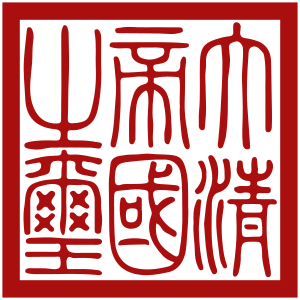 |
|
| Reference style | Her Imperial Majesty |
| Spoken style | Your Imperial Majesty |
| Alternative style | Empress Dowager |
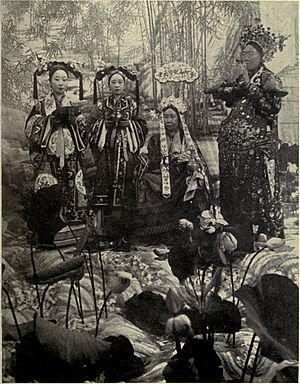
Titles She Held
- During the reign of the Daoguang Emperor (1820–1850):
- Lady Yehe Nara (from 29 November 1835)
- During the reign of the Xianfeng Emperor (1850–1861):
- Noble Lady Lan (from 26 June 1852)
- Concubine Yi (from 28 February 1854)
- Consort Yi (from 27 April 1856)
- Noble Consort Yi (from January/February 1857)
- During the reign of the Tongzhi Emperor (1861–1875):
- Imperial Noble Consort Dowager Yi (from 22 August 1861)
- Empress Dowager Cixi (from 23 August 1861)
- During the reign of the Xuantong Emperor (1908–1912):
- Grand Empress Dowager Cixi (from 14 November 1908)
- Empress Xiaoqinxian (from 16 November 1909)
Special Honours
 Dame Grand Cordon of the Order of the Precious Crown (Japan).
Dame Grand Cordon of the Order of the Precious Crown (Japan). Dame Grand Cross of the Order of Saint Catherine (Russian Empire, 28 May 1897)
Dame Grand Cross of the Order of Saint Catherine (Russian Empire, 28 May 1897)
Family
- Father: Yehenara Huizheng (1805–1853)
- Mother: Lady Fuca
- Brothers:
- Guixiang (1849–1913), father of Empress Xiao Ding Jing
- Sister:
- Wanzhen (1841–1896), mother of the Guangxu Emperor
Her Child
- Son: Zaichun (27 April 1856 – 12 January 1875), who became the Tongzhi Emperor
In Fiction and Popular Culture
- Cixi appears in the historical novel Lotus Blossom (1939) by George Lancing.
- Flora Robson played 'Tzu Hsi' in the 1963 film 55 Days at Peking, about the Boxer Rebellion.
- Der Ling's book The True Story of the Empress Dowager (also called Old Buddha) shows Cixi as an aging woman with regrets, not a monster.
- Pearl S. Buck's novel Imperial Woman tells Cixi's life story.
- Bette Bao Lord's novel Spring Moon includes Cixi and the Boxer Rebellion.
- The novels Empress Orchid (2004) and The Last Empress (2007) by Anchee Min tell Cixi's story from her point of view.
- The 1968 novel Wij Tz'e Hsi Keizerin Van China by Johan Fabricius is a fictional diary of Cixi.
- Lisa Lu played Cixi in two Hong Kong films: The Empress Dowager and The Last Tempest. She also played Cixi on her deathbed in the 1987 film The Last Emperor.
- Liu Xiaoqing played Cixi in several 1980s films, including Burning of Imperial Palace and Reign Behind a Curtain.
- In Lover of the Last Empress, she was played by Chingmy Yau.
- The TV show Towards the Republic (China Central Television) showed Cixi as a capable ruler, a new way of showing her in mainland China.
- She is in the novel The Ginger Tree by Oswald Wynd (1977).
- The Japanese novel The Pleiades focuses on Cixi's relationship with a eunuch. It was made into a 2010 TV series.
- Cixi is a main character in the novel Mandarin by Robert Elegant.
- Earth Queen Hou-Ting in The Legend of Korra is based on Cixi.
- She has been played by Michelle Yim, Susanna Au-yeung, Lü Zhong, Law Lan, and Xi Meijuan in various TV series.
- Cixi is the main villain in the 1991 animated show The Twins of Destiny.
- She is mentioned in the novel East of Eden by John Steinbeck.
See also
 In Spanish: Cixí para niños
In Spanish: Cixí para niños
- Ranks of Imperial Consorts in China#Qing
- Qing Dynasty nobility
- Imperial Decree of declaration of war against foreign powers
- Imperial Decree on events leading to the signing of Boxer Protocol
- Wu Zetian
- Kösem Sultan
 | Stephanie Wilson |
 | Charles Bolden |
 | Ronald McNair |
 | Frederick D. Gregory |


